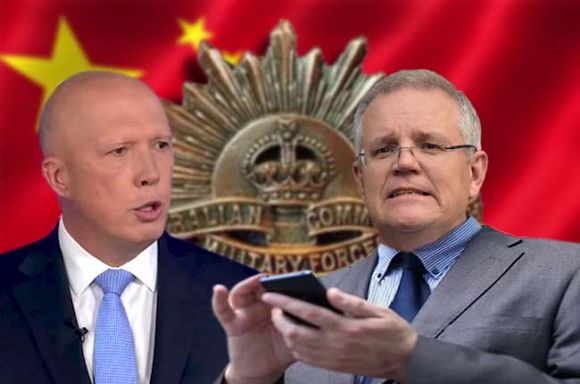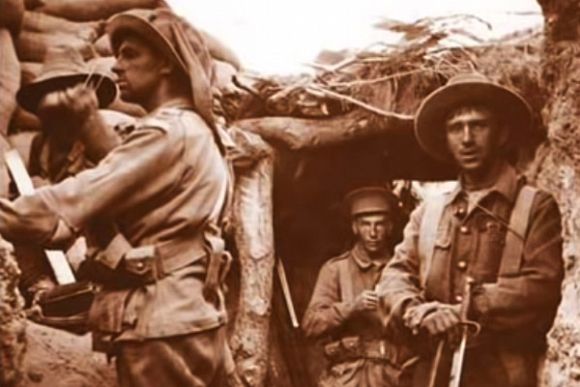As long as Australia clings to the ANZAC tradition of romanticising war, politicians will find excuses to involve our country in foreign conflicts, writes Dr Binoy Kampmark.
WHILE THE MASS slaughtering of – and slaughter by – soldiers is always a touchy subject of commemoration, tension has existed between those who did the fighting and those who ordered it. Comfortably secure in furnished rooms and battle props, planners would, as they still do, draw up the blueprints, concoct the strategy and give the orders.
In Australia, politicians should have every reason to stay out of the grief and suffering to which they contributed by sending their citizenry (wait, “subjects” — for the State remains a constitutional monarchy) to countries they could barely spell. But the bosom and milk of the British Empire were, like U.S. hegemony now, too powerful to resist. Enthusiastic, young volunteers were sent to be cut down in the fields of Flanders and the beaches of Gallipoli.
Things have not improved much since. Apart from the Second World War, which saw Australia’s own coastline threatened by the forces of Imperial Japan, Canberra has fallen into a nasty habit of sending troops to fight other people’s wars. The tendency has begun to resemble that of coke addiction. Vietnam, Afghanistan and Iraq stand out as mercenary missions of invasion and predation rather than defence ventures, the crude calculations of fleshy armchair strategists hankering for security and approval from foreign masters.
The military and political tradition going back to Gallipoli in 1915 is not an enviable one; talk about being slain in the name of freedom is hollow when it comes from the invaders. In a perverse and glorious twist of public relations, modern Turkey’s creator, Mustafa Kemal Atatürk, knew how to turn the bad behaviour of the invasion into the good grace of forgiveness. You, soldiers of ANZAC, invaded us; having died on our soil, you became our sons.
Such skilful marketing is conspicuously ignored every 25 April but remains most profitable for local vendors in Türkiye. It should also be said that, in racial and cultural terms, it clearly ignores the Armenians and those caught in the Turkification project Atatürk pursued with sanguinary tenacity. They died gruesomely, aliens in their own land.
Around these engagements, the politician as a demagogic promoter of ANZAC – the name given to both the Australian and New Zealand Army Corps and the cult surrounding it – has come to the fore. It is common and convenient to link the sacral elevation of the ANZAC tradition – muscular, masculine sacrifice by sturdy blokes keen on freedom and the “fair go” – to former Prime Minister John Howard.
The process of burnishing the legend and reviving it for more contemporary consumption actually began with the Australian Labor Party and Australia’s longest-serving Labor Prime Minister, Bob Hawke.
It was his visit to Gallipoli on the occasion of the 75th anniversary of the Gallipoli landings that made things turn.
The meaning of the ANZAC tradition, Hawke told those gathered:
“...forged in the fires of Gallipoli, must be learned anew, from generation to generation.”
As a wise political chief and one who could shed a tear or two, he suggested that the meaning of the tradition:
“...can endure only as long as each new generation of Australians finds the will to reinterpret it to breathe, as it were, new life into the old story and, in separating the truth from the legend, realise its relevance to a nation and a people, experiencing immense change over the past three-quarters of a century.”
Contrary to Hawke’s hope, the truth from the legend has never been separated, as they never are in the context of any religion. Faith and denial papers over any disparity.
What Hawke left in brick, Howard turned into marble and sinister mythology. ANZAC returned to the cult of mateship indebted to the country and it was to be exploited. Little mention would be made about political responsibility for war; the politician would extol the creed and the rest would follow.
Australians gathered on 25 April, Howard remarked on Anzac Day in 2001, were drawn by:
“...a great silent summons to repay a debt to the past. Each year the numbers of us grow. Each year, more and more young Australians hear the call, though far removed, in time and circumstance, from those they seek to honour.”
Since then, ANZAC has become a militaristic prop, a promotions exercise for arms manufacturers and the publicity for war. This was best exemplified by the decision to spend almost $500 million over nine years to redevelop the Australian War Memorial in Canberra. The primary reason for this profligate spending: to create more room for advertising space for military hardware such as jet fighters, Chinook helicopters and the like.
Disgracefully, there were arguments that making former and current service personnel see such weapons and platforms of war would supply therapy rather than despair. Suffice to say, such PR is not intended to include the victims of such weapons.
The tradition of ANZAC has also done nothing to offer lessons to Australian leaders to be cautious, reflective and wise in sending troops to foreign theatres. Hawke was hardly going to buck the trend of automatic deployment of Australian personnel to wars waged by the U.S. He had, after all, been one of the keenest converts to its messages, spiked by Freedom Land’s convictions. Despite having received no request from Washington to send a military contingent, Hawke, on 10 August 1990, proudly committed three frigates to U.S. Operation Desert Shield.
When Howard’s conservative coalition won office in 1996, the salient lessons of needless death and foolish deployment showed the extent that ANZAC was to be commemorated — as a hat-doffing ceremony to war’s necessity rather than its avoidable dangers.
On Australia’s Vietnam fiasco, he:
“...accepted the Government’s position that the involvement was justified. I accepted then and I see no reason to have changed my mind.”
Students of his record should have found his instinctive throwing of Australian personnel into the U.S.-led attacks on Afghanistan in 2001 and Iraq in 2003 as fairly consistent. He was never a man to learn much and errors could never be put down to stupidity or ignorance.
Unfortunately, the current Labor Government has also suffered the same condition. ANZAC’s lessons of woe and suffering have also failed to filter through the current adjutants of the U.S. empire in Canberra. When the AUKUS security pact was broached to the Opposition Leader, Anthony Albanese, by the previous Morrison Government in 2021, he made the decision to approve it within 24 hours.
He was even “proud” of the decision, noting:
“...that the United States’ position was that a precondition of their support for AUKUS and these arrangements certainly was a bipartisan commitment.”
The arrangements, including the acquisition of nuclear-propelled submarines, were preparations for war with China.
Beware, then, the warmongering jingoes perfumed in freedom-loving garb. They are bound to be the ones leading the country to a blood-soaked demise. And the ANZAC legend has become the ideal, incubating vehicle for doing so, built upon the fiction of sacrificial debt rather than colossal, even criminal, blunders.
Dr Binoy Kampmark was a Cambridge Scholar and is a lecturer at RMIT University. You can follow Dr Kampmark on Twitter @BKampmark.
Related Articles
- Lest we forget the KP120
- Lest we forget the real truth of Simpson and his donkey
- WWII veterans in aged care, like Cliffy Elliott, organised own Anzac service
- Anzac Day: One day, may no one march there at all
- A different kind of Anzac Day
 This work is licensed under a Creative Commons Attribution-NonCommercial-NoDerivs 3.0 Australia License
This work is licensed under a Creative Commons Attribution-NonCommercial-NoDerivs 3.0 Australia License
Support independent journalism Subscribe to IA.

















